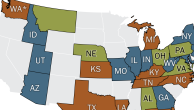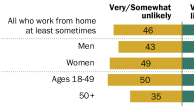Even as automation, smart speakers and other technology-driven applications reshape daily lives, personal engagement and a mastery of fundamentals remain valued in the workplace. In 2018, social and fundamental skills were rated more important than analytical, managerial or mechanical skills in a larger number of jobs. Evidence also suggests that the importance of social skills within occupations has increased more than the importance of other skills in recent decades, a trend that would drive a growing need for social skills regardless of any changes in employment across occupations. Newer jobs, some brought into existence by new technologies, may also fuel a growing need for analytical skills.
The need for social and fundamental skills appears to be on the rise within jobs
In the labor market, the change in demand for a skill is the result of two forces: a rise in employment in jobs more in need of that skill and an increased need for that skill to perform a given job. Shifts in employment have played an important role in raising the demand for social and fundamental skills since 1980 (see Chapter 1). It also appears likely that the need for social and fundamental skills, as well as for managerial skills, has intensified within most occupations in recent decades.
The changing mix of skills within a job is assessed by looking at the importance of each skill within the job relative to the importance of other skills. If the importance rating of, say, social skills increases by more than the ratings of other skills in an occupation, then the relative importance of social skills will increase, and the job will be judged to have become a more intensive user of social skills.23
The charts below show how the relative importance of a skill in 2018 compares with the relative importance of the skill circa 1990. A point lying above the gradient line indicates that the relative importance of the skill in 2018 is greater than its relative importance circa 1990. Such an upward drift appears in most occupations with respect to the relative importance of social, fundamental and managerial skills. Indeed, the need for social skills, in relative terms, increased in 94% of occupations since circa 1990. Over the same period, the relative importance of managerial skills increased in 75% of occupations, and that of fundamental skills rose in 64% of occupations. (For this analysis, “circa 1990” refers to O*NET data from 2003 (Version 5.1), which is based on ratings developed from the late 1970s through the early 1990s for the Dictionary of Occupational Titles.)
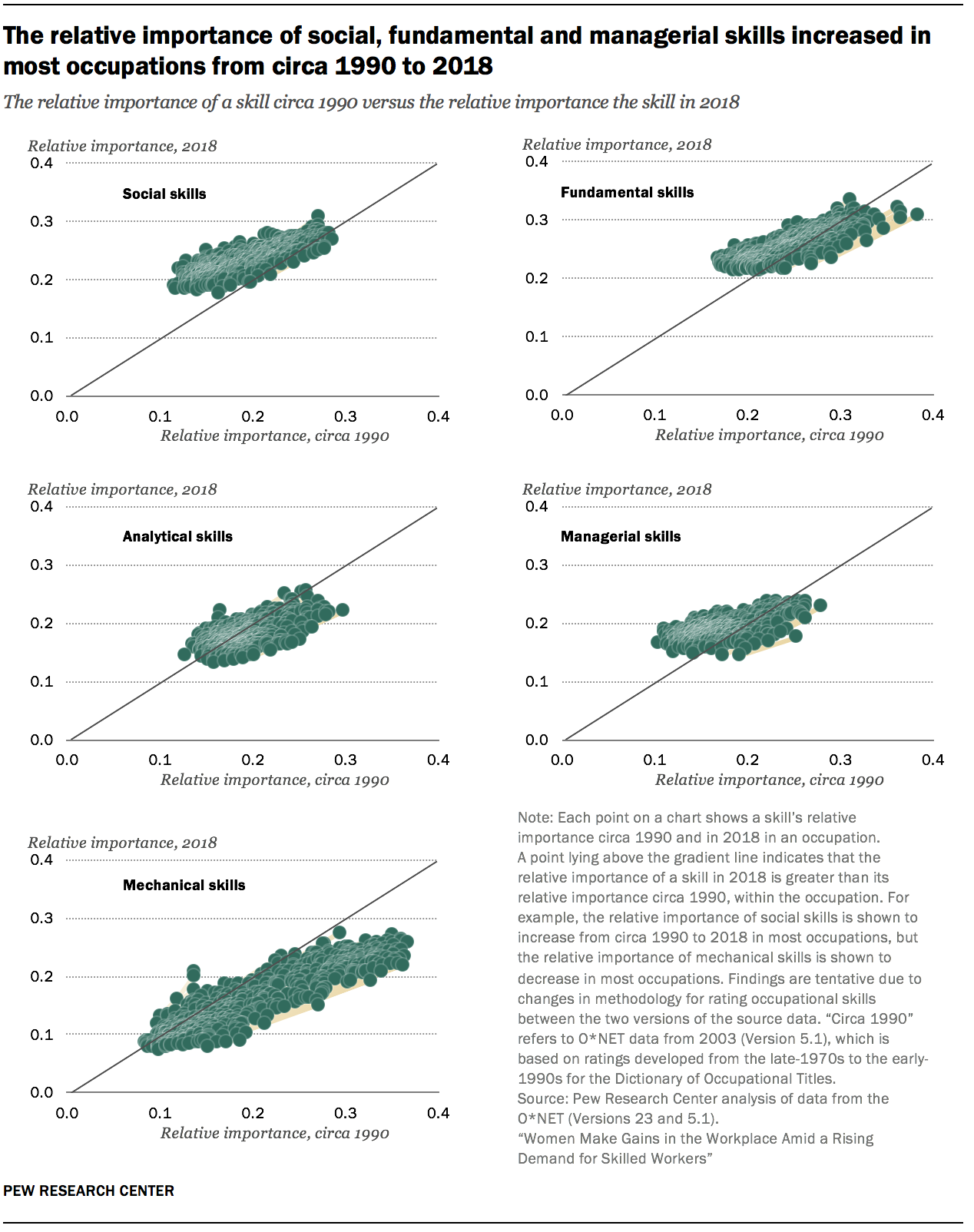
The other side of the coin of these trends is that analytical and mechanical skills became relatively less important within occupations over recent decades. The relative importance of analytical skills dropped in 79% of occupations, and that of mechanical skills fell in 92% of occupations.24 Overall, the indications are that the need for social, fundamental and managerial skills has risen faster than the need for other skills within occupations since the 1980s.
These findings should be treated with caution, however. A definitive conclusion is made difficult by the lack of data that is fully comparable over time. O*NET data using the current schematic for job skills was first released in 2003. The ratings in the 2003 dataset are based on evaluations conducted under the predecessor to the O*NET, the Dictionary of Occupational Titles (DOT). The implicit advantage is that DOT evaluations were conducted from the late 1970s through the early 1990s and yield a longer frame of reference for changes in ratings over time. However, changes in methodology between the DOT and the O*NET confound the comparisons to some degree: The ratings for any given skill for an occupation may have drifted upward or downward with the change in methodology. Focusing on the relative importance of skills corrects for any drift in the ratings that is shared among the five skill groups.25
Emerging occupations call for greater proficiency in analytical skills
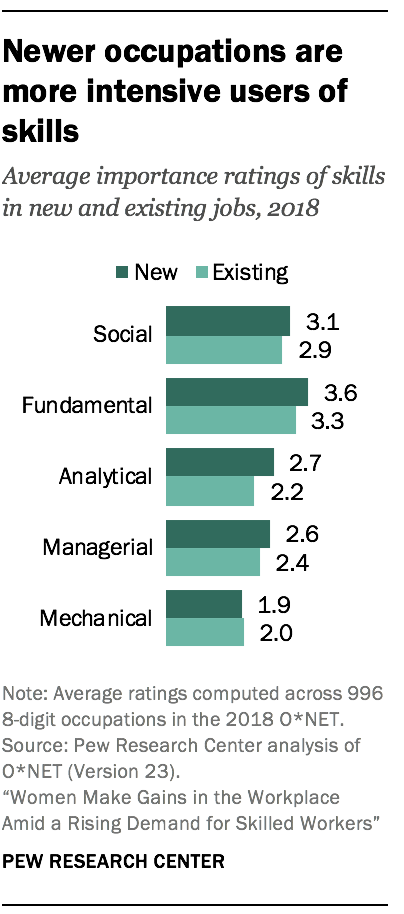
The skills profiles of newer occupations listed in the O*NET point to a rising need for analytical skills in the near future. Starting in 2010, O*NET data listed 147 occupations as “new and emerging,” reflecting the changes driven by modern-day technologies.26 These jobs, such as database architects, informatics nurse specialists and video game designers, often call for greater proficiency in analytical skills, ranging from programming to science to systems analysis and evaluation.
This impression is confirmed by a comparison of the importance ratings for skills in new jobs with the ratings in older jobs in 2018, this time without the worry of changing methodology.27 The biggest difference between new and existing jobs is in their average rating for analytical skills, 2.7 vs. 2.2, or a difference of 21% in favor of new jobs, pointing to a sharper rise in the need for analytical skills in the future compared with the change in past decades.
Other differences in skills between new and older jobs in 2018 are consistent with the trends noted above with respect to changes in skill ratings from the 1980s to 2018. The average rating of social skills in new jobs is 3.1, 7% greater than the rating for social skills in existing jobs. The ratings for fundamental and managerial skills are both 10% higher in new jobs, while the difference in mechanical skills points to potentially a downward drift in the future.28
Social and fundamental skills retain their place at the top
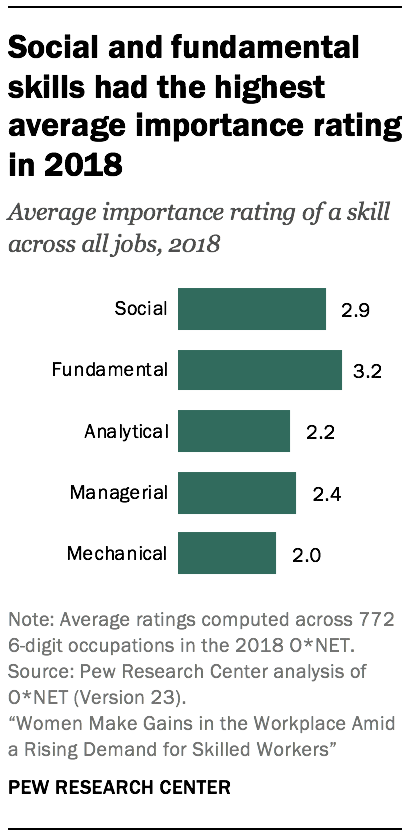
The new occupations do share one trait with existing occupations: Both place the greatest emphasis on social and fundamental skills. Across all jobs combined, fundamental skills received an average importance rating of 3.2 in 2018. That was somewhat higher than the average rating of 2.9 for social skills, and notably higher than the rating for managerial (2.4), analytical (2.2) and mechanical skills (2.0). A rating of three – close to the average for social and fundamental skills across all occupations – means the skill is considered important for the job in O*NET nomenclature.
The five skill groups analyzed in this report are comprised of 35 detailed skills. As listed in the overview, fundamental skills encompass eight finer skills, and four of these skills – active listening, speaking, critical thinking and reading comprehension – appeared at the top of the importance ratings in 2018, with an average rating of 3.4 or higher. Rounding out the list of the top 10 finer skills are two more fundamental skills (judgment and decision making and writing), three social skills (monitoring, social perceptiveness and coordination) and one analytical skill (complex problem solving).29
Looking just below the top 10, one fundamental skill (active learning), three social skills (service orientation, instructing and persuasion) and one managerial skill (time management) complete the list of the top 15 most highly rated skills in 2018. Mechanical skills, such as equipment maintenance, equipment selection, repairing, and installation, are among the lowest rated of the 35 skills in 2018. So too are some analytical skills, such as technology design and programming.
The average importance of a skill also reflects whether it is in widespread use across occupations. Programming, which refers to “writing computer programs for various purpose,” is a higher-order computer skill that is in limited use across occupations.30 Indeed, there are only four occupations, including computer programmers, in which programming is listed as being “very important” to “extremely important” in 2018. On the other hand, programming is rated “not important” in 157 occupations, and its average rating across all 772 occupations examined was 1.5.31
At the other end of the scale is active listening, one of the finer fundamental skills and estimated to have the highest average importance rating (3.6) in 2018. Active listening was rated “very important” to “extremely important” in 196 occupations and at least “somewhat important” in all occupations. There is no occupation in 2018 in which active listening is “not important”; it is a ubiquitous skill.
Among occupations that are top-rung users of skills, the need for social and fundamental skills typically exceeds the need for other skills
The analysis in this report divides occupations into four skill tiers based on the importance rating of each of five skills. Occupations are ranked by their importance rating on, say, fundamental skills, and the top 25% of occupations (the highest quartile) are listed as “most important” users of fundamental skills. Conversely, the bottom 25% of occupations (the lowest quartile) are listed as “least important” users of fundamental skills. This process is repeated for each of the five major skill groups.
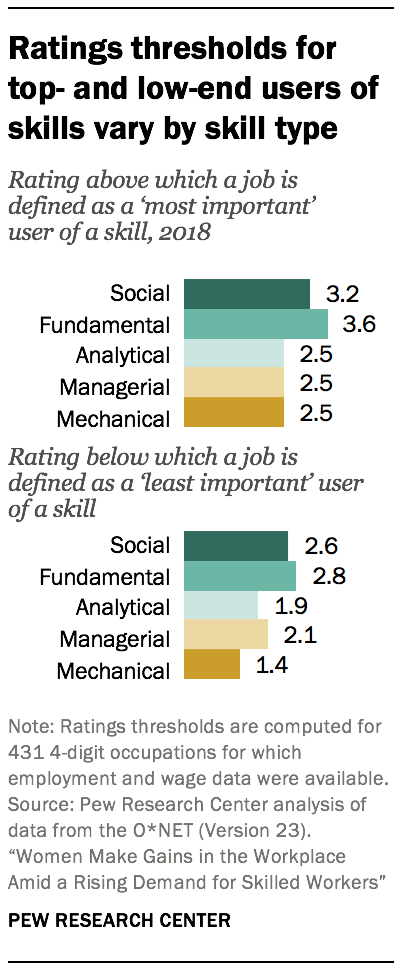
However, the degree to which fundamental skills are needed in the top echelon is not necessarily the same as the degree to which another skill is needed in the top echelon. In 2018, an occupation was a most important user of fundamental skills (in the highest quartile) only if the importance rating for fundamental skills in that occupation was 3.6 or greater. By contrast, the highest ranked users of analytical skills were occupations in which the importance rating for analytical skills was 2.5 or greater. Because fundamental skills, along with social skills, are in greater need across occupations, they represent a higher intensity of use in the uppermost tiers of occupations.
The same pattern prevails with respect to the lowest tier of skills. Occupations are considered “least important” users of fundamental skills if the importance rating of fundamental skills in those occupations is 2.8 or less. But “least important” users of analytical skills are occupations in which the importance rating for this skill is 1.9 or less.
Because the importance of social, fundamental, managerial and analytical skills tends to rise and fall in concert, it is not unusual for an occupation to place in the same tier with respect to more than one skill. “Physics teachers, postsecondary” represent an occupation that is among the top tier users of social, fundamental and analytical skills. But this does not mean that each of these skills is equally important for physics teachers. More specifically, the ratings for the three skills for physics teachers in 2018 are as follows: fundamental – 4.1, social – 3.3, and analytical – 2.8. Thus, a mastery of fundamentals and people skills outrank the need for analytical skills among physics teachers.
